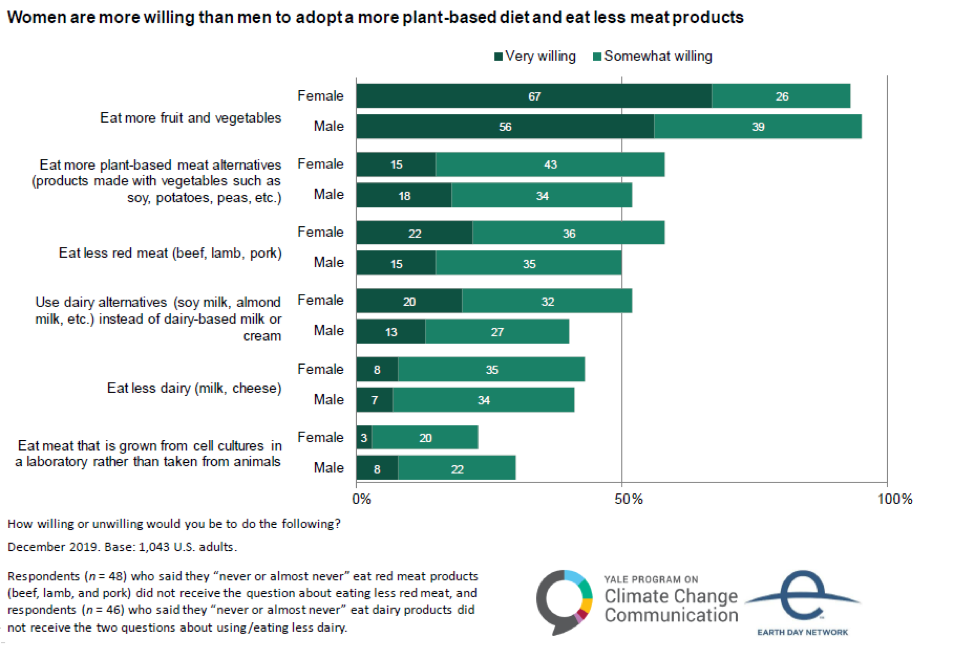Climate Note · Aug 3, 2020
Exploring Gender Differences in the American Diet
By Urvi Talaty, Anthony Leiserowitz, Matthew Ballew, Karine Lacroix and Jennifer Marlon
Filed under: Behaviors & Actions and Beliefs & Attitudes
Men and women in the United States are almost equally likely to believe that global warming is happening, according to the Yale Program on Climate Change Communication and the George Mason Center for Climate Change Communication’s Climate Change in the American Mind data. However there is a wide gap between these two genders when it comes to risk perceptions and worry about global warming. Women are more likely to be worried about the environment and have stronger pro-climate opinions and beliefs than men.[1] Climate change also disproportionately impacts women as compared to men.[2] Higher climate risk perceptions among women may motivate them more than men to take climate action, including their everyday consumer choices.
Some of our daily actions are more related to climate change than many of us know, such as our choice of what to eat, and how much food we waste. As a whole, food systems contribute almost one-third of total greenhouse gas emissions.[3] The systems of food production, consumption and waste also have a large impact on the environment. Here we explore how the different climate change risk perceptions of women and men connect to diet and food waste beliefs and behavior using data from the YPCCC and Earth Day Network’s Climate Change and the American Diet study.
Women are generally more likely to perceive a connection between food waste and global warming. Almost five in ten women (48%) think that if everyone threw away less food, it would reduce global warming by at least “some” (vs. 41% of men). More than half of women (52%) think that if everyone composted food waste, it would reduce global warming by at least “some” compared to only 37% of men. However, women are also often uncertain about the impact their diet-related behavior can have on climate change. When asked about how much eating a plant-based diet would reduce global warming, 22% of women responded “don’t know” (vs. 15% of men). While more women than men (55% vs. 47%) think if everyone cooked over clean cookstoves, it would reduce global warming by at least “some”, more women are also likely to say “don’t know” as compared to men (18% vs 10%).
Men are less likely to have used their purchasing power to reward or punish food companies for their environmental actions. While fewer men perceive a connection between food systems and climate change, they are also less likely than women to exercise their purchasing power by either buying products from food companies that are reducing their impact on the environment or not buying products from food companies that aren’t. More women than men say that they have rewarded food companies that are reducing their environmental impact by buying their products (30% vs. 24%).
Women are more willing to shift their behavior and adopt a plant-based diet. Shifting to plant-based diets and reducing meat consumption is a major opportunity for mitigating and adapting to climate change.[4] However, gender norms can be an important influence on food choices. Eating meat has often been associated with masculinity, and vegetarianism is often seen as a feminine trait.[5] Likewise this study finds that more women than men say they are either “very willing” or “somewhat willing” to eat more plant-based meat alternatives (58% vs. 52%), eat less red meat (28% vs. 20%) and use dairy alternatives (24% vs. 17%). In contrast, men are more willing to eat meat that is grown from cell cultures rather than taken from animals (29%) than women (22%).
The environmental impact of food companies, reducing global warming and protecting animals are more important reasons for shifting to a plant-based diet for women compared to men. Almost seven in ten women (69%) say that helping reduce global warming is at least “moderately” important to them when they choose to purchase plant-based foods (vs. 59% of men). More than seven in ten women (74%) say that how food companies impact the environment is at least “moderately” important to them when they choose to purchase plant-based foods (vs. 67% of men). What other people think is also more influential for women than men, with 30% of women saying it is at least “moderately” important to them as compared to 24% of men.
These findings suggest that more women than men perceive a connection between food systems and climate change, and are also more willing to change their behavior. However, women are also more likely to perceive gaps in their knowledge about climate change. These findings also identify some of women’s motivations to shift to a plant-based diet, which suggest that women are more likely to change their behavior for environmental and animal protection reasons. Generally, a much larger number of women prepare meals and do grocery shopping than men in the United States[6], and thus may potentially have a larger impact on the food system because of their greater share of food purchases. On the other hand, other factors may need to be included in communication campaigns directed towards men, such as culinary characteristics, price of food, and ease of preparation.
Food has important cultural significance for people, but food is also a key way to combat and adapt to climate change. Shifting to a plant-based diet also has additional health co-benefits. For example, compared to an omnivorous diet, the Mediterranean, pescatarian and vegetarian diets are linked to a lower incidence of heart disease, type II diabetes and some types of cancer.[7]
The findings from this study help us understand the gender differences in food-related beliefs and behavior of Americans and point toward several interventions.
The survey methodology and other details can be found in the Climate Change in the American Diet report.
[1] https://climatecommunication.yale.edu/publications/gender-differences-in-public-understanding-of-climate-change/
[2] https://www.nrdc.org/stories/how-climate-change-impacts-women
[3] https://www.nature.com/articles/s43016-020-0031-z?proof=trueMay%2525252F
[4] https://www.ipcc.ch/srccl-report-download-page/
[5] https://www.ncbi.nlm.nih.gov/pmc/articles/PMC5920154/
[6] https://www.pewresearch.org/fact-tank/2019/09/24/among-u-s-couples-women-do-more-cooking-and-grocery-shopping-than-men/
[7] https://www.nature.com/articles/nature13959#ref-CR6



